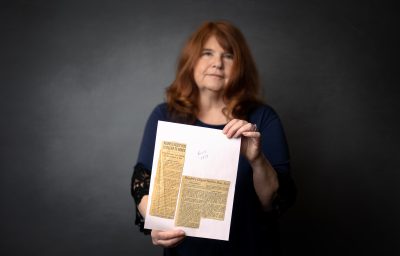Ex-Reader’s Digest Employee Tells Story of Gender Discrimination Suit in New Book

When Elaine Auerbach entered the workforce in the 1960s, she didn’t envision herself being a trailblazer. She planned on working hard and furthering her career opportunities with the chance for advancement.
But five years after being hired by Reader’s Digest in Chappaqua, Auerbach was at the center of a firestorm. She was one of eight women plaintiffs to have a lawsuit filed on their behalf against the company in 1972 that alleged gender bias.
At the time, Auerbach was an associate editor, having been hired after graduating Douglas College in New Jersey in 1967. Her job was to condense articles to fit into the magazine’s format.
Despite hoping to have a long career at Reader’s Digest, she soon found upward mobility would be difficult, if not impossible, to achieve.
“I went in to the managing editor to signal to him that I had career ambitions,” Auerbach recalled. “Being a mother also didn’t indicate that I didn’t want to have a career. I asked what are the skills I needed to become a senior editor, and his responses was, ‘Oh, women don’t become senior editors.’”
Nearly 44 years after Reader’s Digest agreed to pay a more than a $1.5 million settlement, Auerbach has written a new book about the experience, “Dirty Linen: How Women Sued the Reader’s Digest.”
Auerbach remembered that the jarring response that she received forced her to come to the realization that there were no women senior editors or women department heads, except for the excepts and research departments, which were entirely comprised of women. Her female co-workers never seemed to rise above associate editor.
“We figured maybe management didn’t realize that women wanted to have more of an opportunity, that maybe they don’t realize that many women are self-supporting or supporting families,” Auerbach said. “Maybe they didn’t realize they’re discriminating.”
She and another worker visited personnel and with the company’s permission developed a questionnaire to distribute to the company’s female workers. The results, outlined in a report that they called “the white paper,” revealed many more of the company’s women felt they had limited opportunities.
When their findings were ignored, that’s when they took legal action. Even though Reader’s Digest was a great place to work and DeWitt and Lila Wallace were wonderful people, Auerbach said they needed to take that step because the Wallaces, in their view, were breaking the law.
“It was extremely difficult,” she said of the decision to pursue the suit. “People were loyal to the Wallaces, they were loyal to Reader’s Digest and so were the women who took action.”
Columbia University, which had recently developed its urban affairs and clinical legal education programs, took on the case led by attorney Harriet Rabb. Rabb had just been named the first women dean in Columbia Law School history.
More than 100 women were interested in being part of the suit. However, it was easier to move ahead with fewer plaintiffs. Plus, many women who initially supported the litigation turned against the eight for causing trouble, Auerbach said.
The action was settled in November 1977, with the plaintiffs sharing the settlement money with all women in the company. It had far-reaching impact in the publishing and media industry, Auerbach said. While Newsweek also had staffers sue the company, they were looked upon as radical feminists from New York City.
“Reader’s Digest, however, was middle America, it was believed by everyone, it was family,” she said. “It was in everyone’s homes. It was such a big magazine. It was everywhere and it was about as popular as the Bible, and read just about as much.”
Auerbach had always intended to write the book when she had the time. Her plan was to team up with one of her colleagues at Reader’s Digest and co-complainants in the case, Patricia Nell Warren, who went on to become a noted novelist. In 2019, she learned of Warren’s death.
Nearly a half-century later, women are still earning less than men and have been disproportionately impacted by the pandemic, another motivation for Auerbach.
“I thought between the two of us, Patricia and I would tell the story,” said Auerbach, who would have a long career at PepsiCo. “But now she was gone and I was left to tell the story, and I figured I owed it to history. I feel that strongly that people today need to know what went into whatever progress had been made and whatever progress we hadn’t made. There’s more to be made.”

Martin has more than 30 years experience covering local news in Westchester and Putnam counties, including a frequent focus on zoning and planning issues. He has been editor-in-chief of The Examiner since its inception in 2007. Read more from Martin’s editor-author bio here. Read Martin’s archived work here: https://www.theexaminernews.com/author/martin-wilbur2007/
